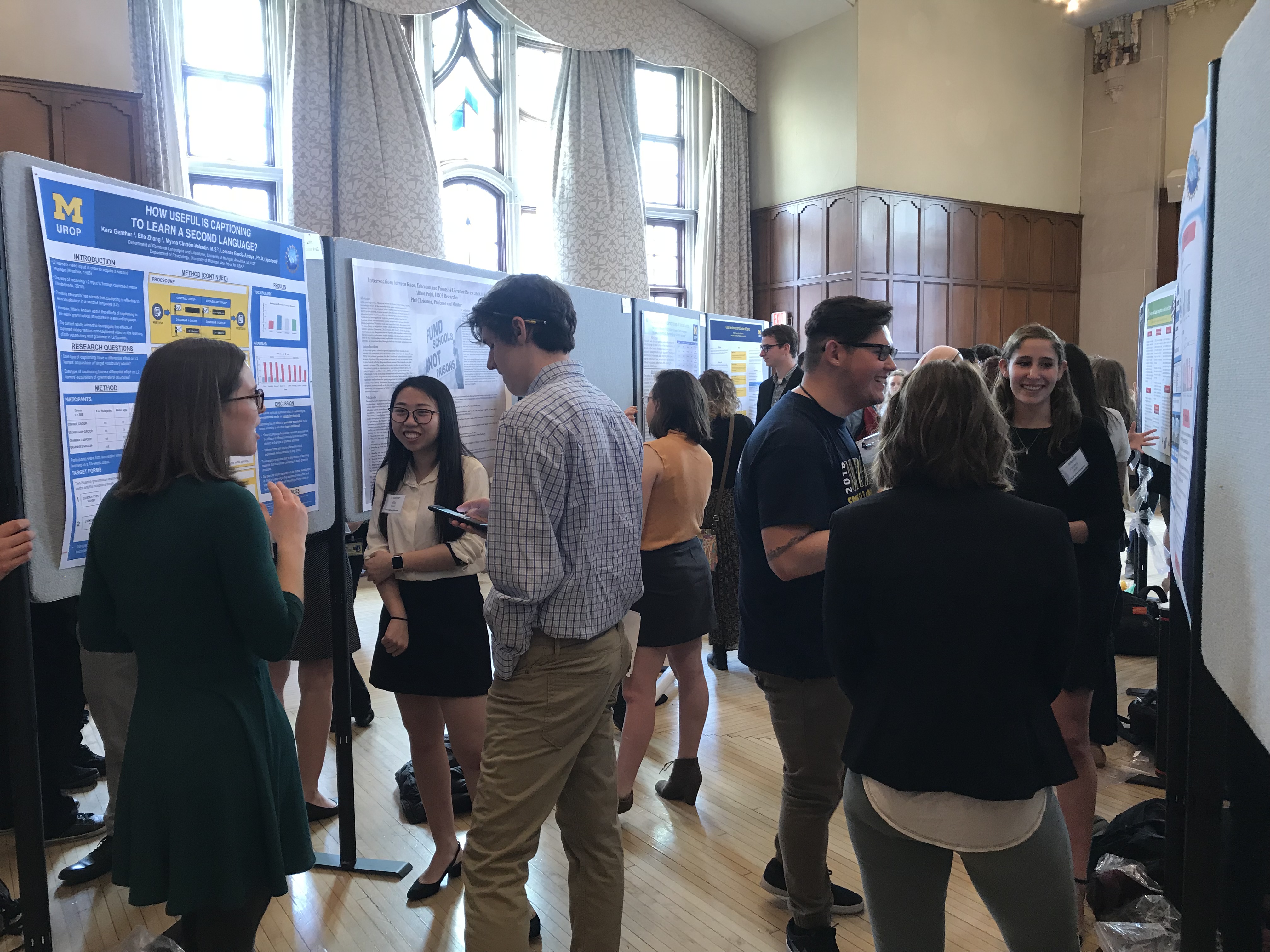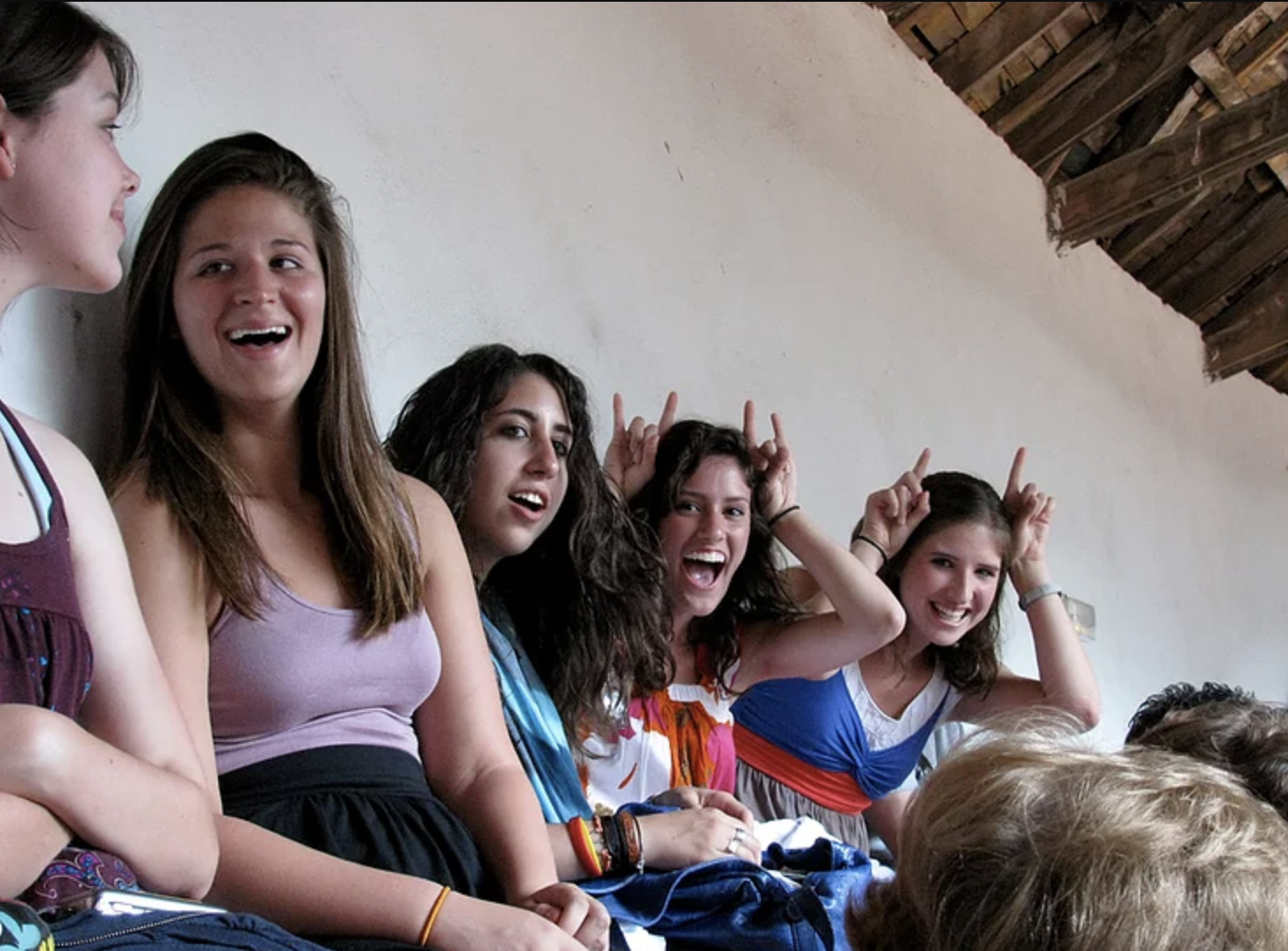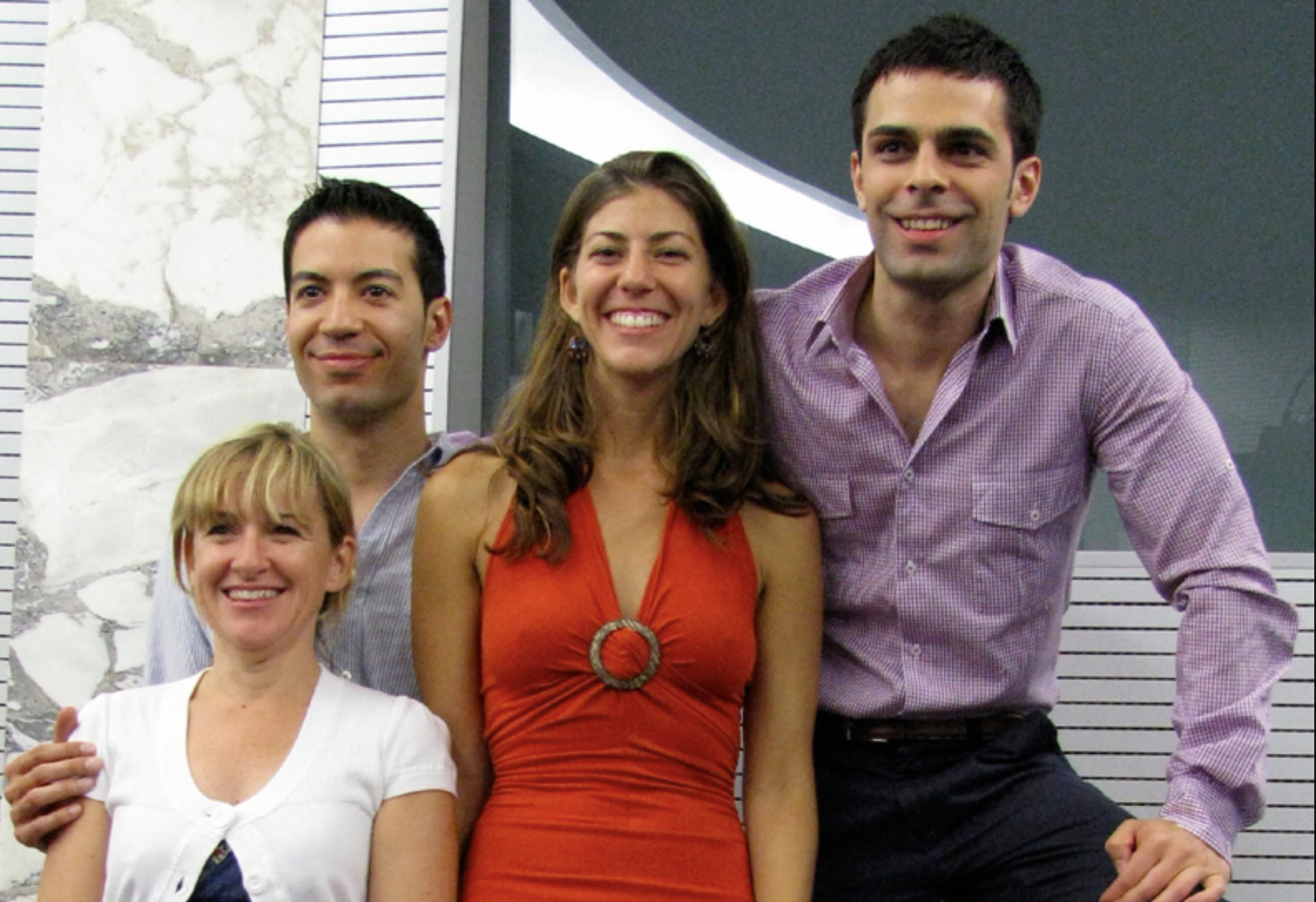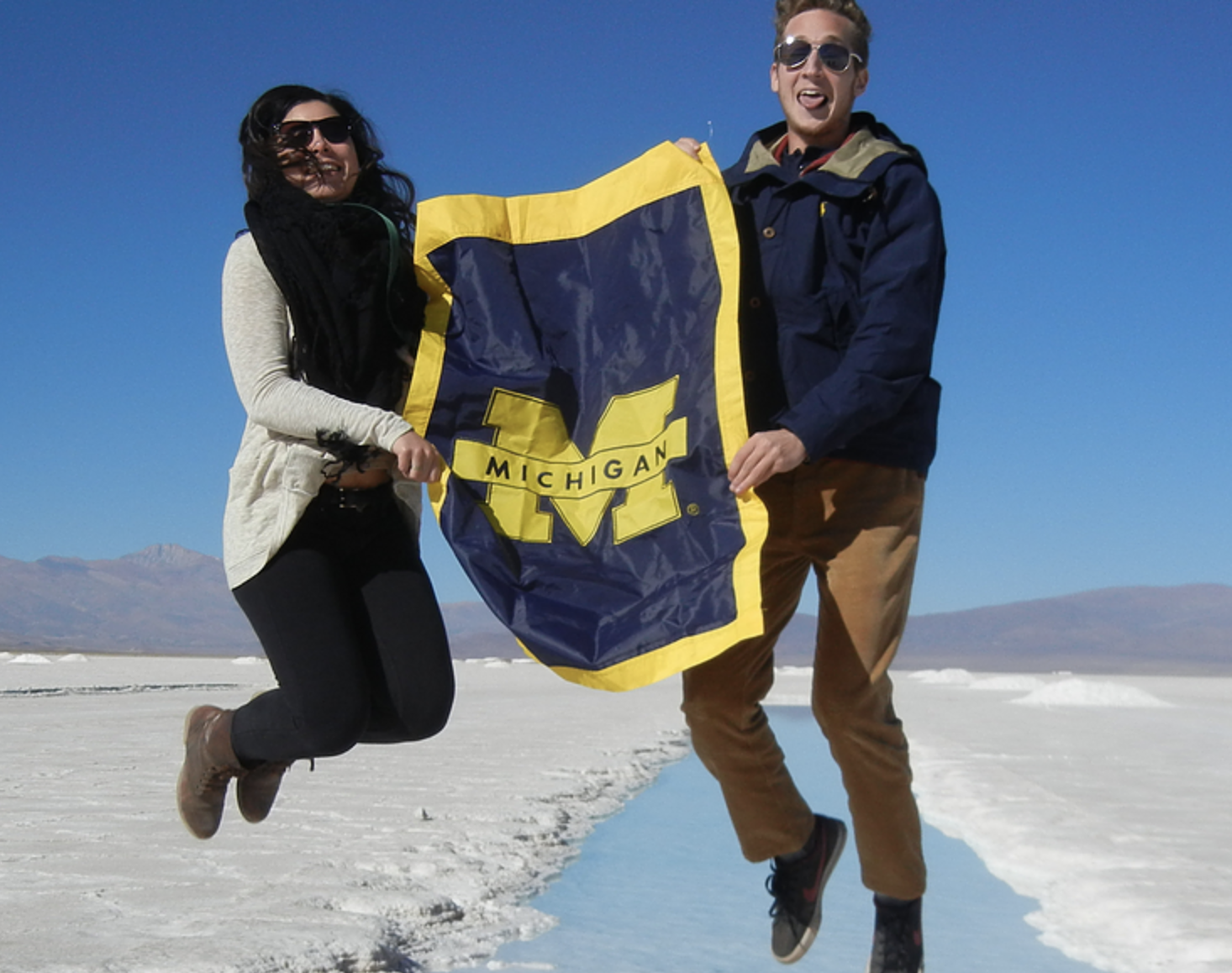Lorenzo García-Amaya
Modern Languages Building - 812 E. Washington Street, Ann Arbor, MI 47405
lgarciaa@umich.edu
I'm a linguist working primarily in the fields of Second Language Acquisition, Psycholinguistics and Sociophonetics. My research focuses on the development of fluency and cognitive abilities by second-language learners and how factors such as cognition, syntactic complexity, and word order affect second-language speech development. I am particularly interested in understanding the effects of language-immersion contexts, as well as of language use and interaction, on second-language linguistic development. More recently, I form part of a large humanities-based collaboration whose mission is to explore how language is entangled with cultural identity through the Patagonian Boers, a community that traces its roots to the South-African Boers who settled in Patagonia, Argentina in the twentieth century. The title of our project is "From Africa to Patagonia: Voices of displacement".
Publications
Refereed Journal Articles
- García-Amaya, Lorenzo. (Accepted). Investigating the relation between L2 pauses, syntactic complexity, and pause location: Longitudinal data from L2-Spanish study-abroad learners. Second Language Research.
- García-Amaya, Lorenzo. (2022). An investigation into utterance-fluency patterns of advanced L2 bilinguals Afrikaans and Spanish in Patagonia. Linguistic Approaches to Bilingualism, 12(2), 163-190.
- García-Amaya, Lorenzo. (2022). Exploring the connection between language use and oral proficiency during study abroad: Results from the Daily Language Questionnaire 2. Foreign Language Annals, 55(1), 198-221.
- García-Amaya, Lorenzo & Myrna Cintrón-Valentín. (2021). The Effects of Textually Enhanced Captions on Written Elicited Imitation in L2 Grammar. Modern Language Journal, 105(4), 919-935.
- Cintrón-Valentín, M., & Lorenzo García-Amaya. (2021). Investigating textual enhancement and captions in L2 grammar and vocabulary: An experimental study. Studies in Second Language Acquisition, 43(5), 1068-1093.
- García-Amaya, Lorenzo. (2021). A change of setting: Measuring language use in an overseas immersion context. Study Abroad Research in Second Language Acquisition and International Education, 6, 32-58.
- García-Amaya, Lorenzo & Sean Lang. (2020). Filled pauses are susceptible to cross-language phonetic influence: Data from Afrikaans-Spanish bilinguals. Studies in Second Language Acquisition, (42)5, 1077-1105.
- Szpiech, Ryan, Joshua Shapero, Andries W. Coetzee, Lorenzo García-Amaya, Paulina Alberto, Victoria Langland, Ellie Johandes, & Nicholas Henriksen. (2020). Afrikaans in Patagonia: Language shift and cultural integration in a rural immigrant community. International Journal of the Sociology of Language, 266, 33-54.
- Henriksen, Nicholas & Lorenzo García-Amaya. (2019). Falsetto in interaction in Western Andalusian Spanish: A pilot study. Revista Internacional de Lingüística Iberoamericana, 34, 101-124.
- Cintrón-Valentín, Myrna, Lorenzo García-Amaya, & Nick C. Ellis. (2019). Captioning and grammar learning in the L2 Spanish classroom. The Language Learning Journal, 47(4), 439-459.
- García-Amaya, Lorenzo. (2017). Detailing L1 and L2 use in study-abroad research: Data from the Daily Linguistic Questionnaire. System, 71, 60-72.
- Henriksen, Nicholas & Lorenzo García-Amaya. (2012). Transcription of intonation of Jerezano Andalusian Spanish. Estudios de Fonética Experimental, 21, 109-162.
- García-Amaya, Lorenzo. (2008). The effect of topic on rate of speech. ELIA (Estudios de Lingüística Inglesa Aplicada), 8, 117-150.
Refereed Conference Proceedings and Book Chapters
- García-Amaya, Lorenzo, Harjus Jannis, Henriksen, Nicholas. (2019). Introduction. Andalusian Spanish: The State of the Art. Revista Internacional de Lingüística Iberoamericana, 34, 7-13.
- Henriksen, Nicholas, Lorenzo García-Amaya, Andries W. Coetzee & Daan Wissing. (2019). Language contact in Patagonia: Durational control in the acquisition of Spanish and Afrikaans phonology. In F. Martínez-Gil & S. Colina (Eds.), The Routledge Handbook of Spanish Phonology (pp. 414-436). NewYork: Routledge.
- Coetzee, Andries, Lorenzo García-Amaya, Jiseung Kim, Daan Wissing & Nicholas Henriksen. (2019). Velar palatalization in Patagonian and South-African Afrikaans: Language and Settlement History in an Expatriate Community. In S. Calhoun, P. Escudero, M. Tabain & P. Warren (Eds.), Proceedings of the 19th International Congress of Phonetic Sciences, Melbourne, Australia 2019 (pp. 1610-1614). Canberra, Australia: Australian Speech Science and Technology Association Inc.
- Alberto, Paulina, Ana Silva, Andries W. Coetzee, Lorenzo García-Amaya, Victoria Langland, Ryan Szpiech, Ellie Johandes, & Nicholas Henriksen. (2019). Los otros afro-argentinos: Narrativas raciales de la colectividad sudafricana de la Patagonia del siglo XX. In E. Lamborghini, M. Ghidoli, & J. F. Martínez Peria (Eds.), Estudios Latinoamericanos 4: Actas de las Sextas Jornadas del GEALA (pp. 175-190). Buenos Aires: Editions of the Cultural Center of the Floreal Gorini Cooperation.
- García-Amaya, Lorenzo. (2018). Utterance fluency in the study abroad context: An overview of research methodologies. In C. Sanz & A. Morales-Front (Eds.), The Routledge Handbook of Study Abroad Research and Practice (pp. 181-192). New York: Routledge.
- Henriksen, Nicholas, Meghan E. Armstrong, & Lorenzo García-Amaya. (2016). The intonational meaning of polar questions in Manchego Spanish spontaneous speech. In M. Armstrong, N. Henriksen, & M. Vanrell (Eds.), Intonational Grammar in Ibero-Romance: Approaches across linguistic subfields (pp. 181-206). Amsterdam: John Benjamins.
- García-Amaya, Lorenzo. (2015). A longitudinal study of filled pauses and silent pauses in second language speech. In R. Lickley (Ed.), The 7th Workshop on Disfluency in Spontaneous Speech (DiSS 2015). Edinburgh, UK: the University of Edinburgh.
- Coetzee, Andries W., Lorenzo García-Amaya, Nicholas Henriksen, & Daan Wissing. (2015). Bilingual speech rhythm: Spanish-Afrikaans in Patagonia. In The Scottish Consortium for ICPhS 2015 (Eds.), Proceedings of the 18th International Congress of Phonetic Sciences. Glasgow, UK: the University of Glasgow.
- Abelló-Contesse, Christián & Lorenzo García-Amaya. (2012). Bardovi-Harlig, Kathleen. In C.A. Chapelle (Ed.), The Encyclopedia of Applied Linguistics. Oxford, UK: WileyBlackwell.
- Geeslin, Kimberly L., Lorenzo García-Amaya, Maria Hasler-Barker, Nicholas C. Henriksen & Jason Killam. (2012). Variability and the L2 acquisition of perfective past time reference in Spanish in an abroad immersion setting. In K. Geeslin & M. Díaz-Campos (Eds.), Selected proceedings of the 14th Hispanic Linguistic Symposium (pp. 197-213). Somerville, MA: Cascadilla Press.
- Geeslin, Kimberly L., Lorenzo García-Amaya, Maria Hasler-Barker, Nicholas C. Henriksen & Jason Killam. (2010). The development of variation in clitic pronouns among Spanish L2 learners in an abroad immersion program. In C. Borgonovo, M. Español Echevarría & P. Prévost (Eds.), Selected proceedings of the 12th Hispanic Linguistic Symposium (pp. 246-259). Somerville, MA: Cascadilla Press.
- García-Amaya, Lorenzo. (2009). New findings on fluency measures across three different learning contexts. In J. Collentine, M. García, B. Lafford & F. Marcos-Marín (Eds.), Selected Proceedings of the 11th Hispanic Linguistics Symposium (pp. 68-80). Somerville, MA: Cascadilla Press.
- García-Amaya, Lorenzo. (2008). Variable norms in the production of /θ/ in Jerez de la Frontera, Spain. In J.F. Siegel, T.C. Nagle, A. Lorente-Lapole & J. Auger (Eds.), IUWPL7: Gender in Language: Classic Questions, New Contexts (pp. 49-71) Bloomington, IN: IULC Publications.
Projects
March 2016 - Present
From Africa To Patagonia: Voices of Displacement
In 1902, a group of South African inmigrants with farming experience arrived to Buenos Aires with the mission to settle in the arid lands of Patagonia. More than a century later, Afrikaans is still spoken in the farms and cities near where the first Boer settlement took place. The present speakers of Afrikaans are the last generation of bilingual speakers of Afrikaans and Spanish in Patagonia, creating a rather unique Spanish-Afrikaans language contact situation. This project is a collaborative effort with other colleagues from the University of Michigan.
Check out our website!
The relationship between proficiency and cognitive abilities in an L2 under contexts of L1 inhibition
Do L2 learners with better working memory resources benefit from learning contexts where the L1 is inhibited? If so, how? This project examines individual differences in Second Language Acquisition and the specific relationship between cognitive abilities and different dimensions of L2 acquisition such as degree of proficiency.
The effects of an L2 intensive immersion experience on L1 attentional resources: A comparative study of two learning contexts
There is growing interest in SLA to understand the relationship between cognitive abilities and fluency, or oral speech production, in a second language. This project addresses the development of this relationship with learners who do and do not have previous abroad experience.
Second language learning in different contexts: Freed and Collentine’s Language Contact Profile revisited
Although there are a number of questionnaires that address specific language use in different learning contexts, the Language Contact Profile designed by Freed, Dewey, Segalowitz, & Halter (2004) is one of the most comprehensive and widely used in the field. This research project is an attempt to revisit Freed et al.'s questionnaire, taking into account the particulars of short intensive immersion programs.
The relationship between hesitation phenomena, discourse markers and clause types in the oral production of second language learners across three learning contexts
It is well-known to those that interact with L2 learners that L2 speakers hesitate more in their L2 than in their L1. However, it is not so clear what happens to such hesitation phenomena. Are such hesitation slots permanent? Do they change or become substituted over time as L2 sytactic complexity develops? This project accounts for this development in L2 learners with experience from three different learning contexts.
Components to L2 fluency: Using statistics to see what really matters to listerners & Understanding rhythm as an essential component of speech in SLA and Bilingualism
What is fluency? Previous literature provides a variety of metrics to account for speech production, but we still need to undestand which metrics really matter to listeners, if this varies, and if so, why is this the case? This project also looks at rhythm as a possible component in the development of fluency.
Public Scholarship
Animated Videos
- García-Amaya, Lorenzo. (2021). ‘Why do we, like, hesitate, when we, um, speak?’ TED-Ed Lesson. Script writer role.
- García-Amaya, Lorenzo. (2021). ‘Why are there Afrikaans speakers in Argentina?’ Animated video for the From Africa to Patagonia: Voices of Displacement. Project director and Scriptwriter. [To be released on April 27, 2021]
- García-Amaya, Lorenzo. (2020). ‘Words You Didn’t Know: Collaborating to Discover the Secrets of Second Languages’ ‘Last Lecture’ delivered on receiving the 2020 Golden Apple Award at the University of Michigan by Invitation, October 16, 2020.
Public Essays
- Cook, Ian, Ella Deaton, Ellie Johandes, Kelly Kendro, Paulina Alberto, Andries Coetzee, Lorenzo García-Amaya, Victoria Langland, Ana Silva, Ryan Szpiech, & Nicholas Henriksen. (2020). Collaboration transcending crisis: An innovative faculty-student collaborative model. Inside Higher Ed.
- Silva, Ana M., Paulina L. Alberto, Andries W. Coetzee, Lorenzo García-Amaya, Ellie Johandes, Victoria Langland, Ryan Szpiech, & Nicholas Henriksen. (2019). La asombrosa historia de los gauchos sudafricanos de la Patagonia. Clarín (Viva), 5 May 2019), 16-20.
- Szpiech Ryan, Andries Coetzee, Lorenzo García-Amaya, Paulina Alberto, Victoria Langland & Nicholas Henriksen. (2019, January 8). Language and identity: Lessons from a unique Afrikaans community in Patagonia. The Conversation. Retrieved from http://theconversation.com/
- Henriksen, Nicholas, Andries Coetzee, Lorenzo García-Amaya, Paulina Alberto, Victoria Langland & Ryan Szpiech. (2018). Afrikaans in Patagonia: Voices of displacement. Babel, The Language Magazine. (pp. 16-21). Huddersfield: University of Huddersfield.
Press Mentions & Interviews
- This is What We’re Talking About Podcast. (2021). The Workings: From Human to Human Society. (Interviewer: Meiru Chen)
- Michigan Alumnus Magazine. (2020). Office Hours: Language Learning. Lorenzo García-Amaya discusses language. (Author: Sharon Morioka)
- The University Record. (2020). Golden Apple recipient animates message of student learning. (Author: Ann Zaniewski)
- The University Record (2020). García-Amaya receives 30th Golden Apple Award in virtual surprise. (Author: Jeff Bleiler)
- The Michigan Daily. (2020). Spanish professor Lorenzo García-Amaya wins 2020 Golden Apple award for excellence in teaching. (Author: Carter Howe)
- BBC. (2019). Patagonia’s last Boers keeping Afrikaans alive.
- The Times. (2019) Boers of Patagonia keep Afrikaans alive. (Author: Jane Flanagan)
- Times Higher Education. (2019). Women in STEM: how to combine science and humanities research. (Author: Ellie Johandes)
- Die Burger (South Africa). (2019). Dis ons land die, maar Afrika is my regte land. (Author: Malani Venter)
- Rapport (South Africa). (2019). Die Afrikaners van Argentinië. (Author: Dawie Boonzaaier)
- El Patagónico (Argentina). (2014). Cineasta sudafricano está rodando un documental sobre los bóers.
- The Michigan Daily. (2013). Professor Profile: Lorenzo García-Amaya. (Author: Molly Block)
Collaboration in Online Archives
- This Interactive Atlas of Spanish Intonation. Pilar Prieto & Paolo Roseano coordinators.
- From Africa to Patagonia Digital Archive. Nicholas Henriksen & Lorenzo García-Amaya coordinators.
Teaching
Core Courses:
SP487 - The Acquisition of Spanish in a Study Abroad Setting
This is a three-credit course that provides an introduction to Second Language Acquisition (i.e., SLA) in general, and more specifically, to the acquisition of Spanish in different learning contexts, particularly the Study Abroad context. This course covers an introduction to Second Language Acquisition and the origins of this field of research, as well as important aspects that influence second language learner outcomes in different learning contexts. Specifically, the acquisition of grammatical abilities, pragmatic and communicative abilities as well as the development of fluency and cognitive abilities and the lexicon in different learning contexts. Other aspects such as the type of instruction in the Study Abroad setting and cultural adaptations to different learning contexts are alsoaddressed in the course. The goal of this course is to provide students with a level of knowledge that enables them to succeed in future Spanish linguistics courses and in careers involving knowledge of the L2 learning process as well as in the study abroad context.
SP418 - Theories of Second Language Acquisition
This course provides an introduction to Second Language Acquisition (i.e., SLA) in general, and more specifically, to the acquisition of Spanish by second language learners. Thus, the content includes the most relevant theories of Second Language Acquisition as well as research in L2 Spanish. Students will apply their knowledge of course content in various data analysis activities, quizzes, exams, and a final research paper. The goal of this course is to provide students with a level of knowledge that enables them to succeed in future Spanish linguistics courses and in careers involving knowledge of the L2 learning process.
SP413 - Methods of Teaching Spanish
This is a three-credit course that provides an introduction to second language learning and teaching with a particular emphasis on L2 Spanish. Students are introduced to the most relevant theories of second language learning and to different teaching methodologies that have developed from these theories. In this course students will have the opportunity to learn how to effectively teach various linguistics skills and put that knowledge into practice with their classroom peers. The goal of this course is to provide students with a level of knowledge that enables them to succeed in future SLA/linguistics courses and in careers involving knowledge of second language learning development and foreign language teaching.
SP298 - Introduction to Spanish Linguistics
This is a three-credit course that provides an introduction to Spanish Linguistics and establishes the basis for future application of linguistic principles. The content included is an overview of basic linguistic properties with a focus on Spanish. First students are introduced basic principles and concepts in linguistic theory and linguistic structure, to later examine the linguistic structure of the Spanish language based on the following fields of linguistic inquiry: word formation (morphology), word order (syntax), the sound system (phonetics and phonology), history of the language, and second language acquisition. The goal of this course is to provide students with a level of knowledge that enables them to succeed in future Spanish Linguistics courses.
Other Courses Taught:
SP499 - Undergraduate Honors Thesis
SP435 - Independent Study
This is a three-credit course that enable students interested in linguistics to pursue a topic of their academic interest conducting a research project throughout a semester. Recent projects include the following: Andrés Espinoza studied the development of cognitive abilities in a study abroad context Winter 2014. Angeline Gonyea & Yumi Masuda studied the development of syntactic complexity in L2 learners of Spanish in Fall 2014, and Sarah Awad-Farid, Stephen Daniels, & Jeremy Neuman investigated the development of the perception of foreign access in Winter 2013.
SP428 - Internship Abroad
SP299 - Internship Abroad
UROP

The Undergraduate Research Opportunities Projects (UROP) program is an extremely rewarding experience for undergraduate student researchers and their faculty mentors. Here is a list of students who have collaborated with me on various projects. For additional information, you can visit the RLL Speech Production Lab.
2022-2023
Dinah Atiqah, David Cano, David Felix-Trejo, Hanzhen Zhu
2021-2022
Emma Griffin, Max Morius
2020-2021
Mara Estrict, Reneta Martell, Yonghuan Hu
2019-2020
Mateo Amprimo, Donavin Stoops, Juan Tambupolon
2018-2019
Matthew Neubacher, Brysyn McHenry
2017-2018
Mackenzie Kramer, Kara Gunther, Lauren Levitt, Ella Zhang
2016-2017
Andrew Dicks, Moiz Mahmood, Elias Murdoch-Morales, Angelica Orellana, Brooke Perras, Maria Uribe
2014-2015
Lauren Guldan, Aaron Keyes, Alec Hall
2013-2014
Paul Akande, Sara Drlik, Bryan Frederick, Lauren Guldan, Aaron Keyes, Sandra Zadeyeh
2012-2013
Maya Adamczyk, Monique Becker, Sara Drlik, Andrés Espinoza, Bryan Frederick, Emily Plumley, Amanda Said, Thomas Sorek, Megan Spencer
Study Abroad
The study abroad context offers unique opportunities for learners to improve their linguistic skills (and many other aspects related to their cultural competence), as well as for researchers to study many aspects of second language development.
Past Study Abroad Programs
- 2022 Santiago de Compostela, University of Michigan, Instructor
- 2019 Salamanca, University of Michigan, Instructor
- 2014-2015, 2017 Salamanca, University of Michigan, Instructor
- 2012 Toledo, University of Alabama at Birmingham, Director
- 2005-2010 León, Indiana University, Director
I also coordinate the Spanish internships abroad in RLL. We offer a three-credit course for an internship that involves the extensive use of Spanish in a country in which Spanish is the primary language. The LSA International Internship Program places students into six- to twelve week internships abroad. My students have worked for a companies, public hospitals, and NGOs in a diverse set of Spanish-speaking countires. For more information about their experiences abroad, please visit our blog: Spanish Internship 2016
The pictures surrounding this text were taken by students of mine who have participated on different Study Abroad/Internship experiences over the years. Enjoy!


